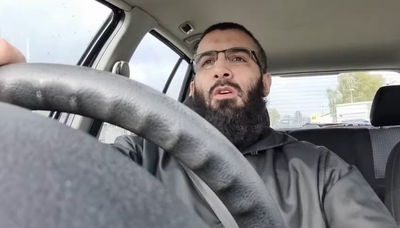“Salafist Police” Targeting Westernized European Muslims

by Abigail R. Esman
IPT News
April 25, 2023
 Dutch Sheikh Rachid Abu Kuzaymah warns of Muslims embracing “shameless behavior and modernist values.” Dutch Sheikh Rachid Abu Kuzaymah warns of Muslims embracing “shameless behavior and modernist values.” |
Some call them the Salafist police. Others say they are just ordinary extremists. Either way, they are terrorizing other Muslims in the Netherlands, radicalizing Muslim youth, and working to undermine the secular democratic system – not just in Holland, but in Belgium, France, and elsewhere across Europe.
While America seems to have largely forgotten the threat of radical Islamism, jihadism, according to Dutch intelligence agency AIVD, remains the greatest security threat for Europe. That threat exists not only in the form of terrorist violence, but in the effect of online propaganda, Salafist-run schools, intimidation on social media, and ongoing efforts at polarizing European society as Salafist groups and charismatic activists urge fellow Muslims to reject Western democratic mores.
Now a report by Dutch newspaper Telegraaf has Parliament asking questions: what, some members want to know, can security agencies do to prevent that kind influence and the threats against moderate Muslims (and non-Muslims) by extremists, both in person and online?
The disturbing answer: not much.
At least, not just now.
According to the Telegraaf, Salafist extremists, including younger, second- and third-generation Muslims born and raised in The Netherlands, are loudly condemning everything they consider “too Western” – from listening to music and watching soccer games to wishing others “happy Christmas” or, more shameful still, allowing wives and daughters to appear in public without a veil or hijab. “Whoever they perceive as crossing the line,” the Telegraaf reports, “will soon find himself denounced and condemned online.” Some offer rewards for the addresses of “evildoers.” Children threaten their parents. And still the recruitment continues. “Although the group is relatively small, its members can have a disproportional influence on the Islamic community of the Netherlands,” the AIVD report for 2022 noted.
That influence is not limited to social media and the mosques, or even local communities. For years, the AIVD and its sister organization, the National Coordinator for Terrorism and Violence (NCTV), have cautioned that the growing number of Salafist schools are shaping the minds and ideologies of hundreds, if not thousands, of Dutch Muslim children. And often, parents are at a loss to fight it. “The first generation of Muslims in The Netherlands followed a more moderate interpretation of their faith,” the AIVD wrote in 2021. “Parents from the second- and third generation…are more vulnerable to a strict form of Islam. If a follower has enough theological knowledge and charisma, parents are sometimes unsure how to work against that.”
Rachid Abu Kuzaymah, a self-proclaimed publisher based in Utrecht, seems to be just that kind of influencer. With more than 14,000 Facebook followers, Kuzaymah (aka Rachid Bouabid), frequently rants against the perversity of the West and the moderate, Westernized Muslims whose views about human rights, equality, and justice he deplores. In Facebook, Twitter, and Telegram posts, he accuses the Dutch government – and those who comply with its laws rather than sharia – of trying to undermine Islam.
“Shameless behavior and modernist values are making their way into the Muslim community,” he warned last month. In a long thread, he noted, “whilst, in an era where western culture is known for having the lowest morals with regards to men and women, honor, jealousy, manhood, etc., a western convert should be the most cautious with regards to these topics and realize the necessity of being a humble learner in this field. Yet we see the exact opposite. Western superiority complex is a problem, even among some Muslims, and it’s one of the biggest dangers to true Islamic masculinity.”
Not satisfied with one social media outlet, Kuzaymah kept on. “When a movement arrives tomorrow that truly strives to practically implement the solution Allah instructed us to in the Qu’ran,” he posted recently on his Facebook page, “they will be in the forefront of writing it off as terrorism, for the satisfaction of the disbelievers.”
With such messages, the Telegraaf maintains that Kuzaymah and others are causing major schisms in the Muslim community, even as they work to divide Muslim from non-Muslim Dutch, urging those who follow them to reject the secular state. Already, more and more of the Salafist community are refusing to take part in elections, or to interact with non-Muslims. “It is for the moment uncertain what consequences this… will have for the threat of undermining the democratic order emanating from the Salafist ideology,” the AIVD warned. Coupled with the thousands of students now attending Salafist schools or being schooled in Salafist homes, it is no wonder the intelligence agencies are concerned.
So, too, are members of Parliament. Following the Telegraaf report, members questioned the minister of Justice and Security and the minister of Social Affairs about the allegations. “I find these antidemocratic, intolerant, and bigoted statements extremely undesirable,” Dilan Yesilgoz-Zegerius, the Minister of Justice and Security, told her fellow parliamentarians in a lukewarm condemnation. And yet, law enforcement can do little about them, she admitted; there is no monitoring of radical Salafists, and laws limit the sharing of information about “soft suspects” with other countries. “Although the [Police Data Act] obliges police data to be made available with other EU/EEA countries, it does not allow soft signals about persons who may be involved in planning or committing terrorist crimes to be passed on to other countries,” she noted. “These persons are not (yet) suspects. The information exchange with Europol has the same limitation.” True, some of these issues could be resolved by laws recently proposed in Parliament, but passage of such laws could take years.
Asked about the “Salafist police” moniker, Yesilgoz-Zegerius said she had no indication that such a formal organization actually exists: by strict definition, she pointed out, such an organization would have powers charged to it by an official body, which is not the case. Whether members of the Salafist community view themselves as a monitoring “police force,” however – or whether moderate Muslims in Holland perceive them that way – is not entirely clear.
Meantime, neighboring countries are experiencing similar problems. Recruiters target Muslim youth on Telegram and game chats, according to Belgian newspaper Het Laatste Nieuws (HLN). And in Germany, security agencies warned recently that jihadists were being smuggled into Germany, the UK, and other European border countries, largely from Central Asia and the Middle East, HLN reported, noting that recruits are also up in Russia. “The threat posed by Islamist Extremism remains at a high level,” Germany’s security agency advises on its web site. “We have to expect that an Islamist extremist attack in Germany could happen at any time.”
It’s a danger only magnified by the radicalization of Europe’s Muslim youth, as much in the streets and online as in the schools.
For years, the hope in Europe had been that each generation of Muslim immigrants and their children would come closer to embracing Western values, the ideals of the Enlightenment.
Now, it’s not so sure.
 IPT Senior Fellow Abigail R. Esman is a freelance writer based in New York and the Netherlands. Her latest book, Rage: Narcissism, Patriarchy, and the Culture of Terrorism, was published by Potomac Books in October 2020. Follow her at @abigailesman.
IPT Senior Fellow Abigail R. Esman is a freelance writer based in New York and the Netherlands. Her latest book, Rage: Narcissism, Patriarchy, and the Culture of Terrorism, was published by Potomac Books in October 2020. Follow her at @abigailesman.
Copyright © 2023. Investigative Project on Terrorism. All rights reserved.
Related Topics: Education, Shariah | Abigail R. Esman, Salafism, Holland, AIVD, radicalization, secularism, National Coordinator for Terrorism and Violence, Rachid Abu Kuzaymah, Dilan Yesilgoz-Zegerius, Education, Shariah















